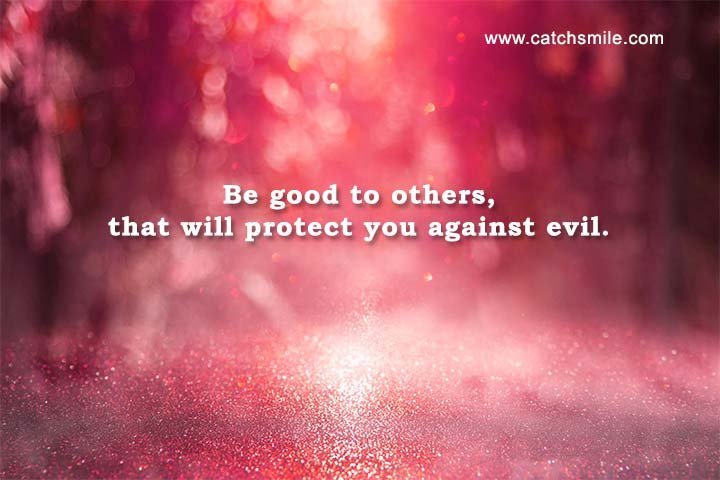Be good to others, that will protect you against evil.
The quote “Be good to others, that will protect you against evil” encapsulates a moral and philosophical principle that suggests kindness and compassion towards others can act as a safeguard against malevolent forces or negative consequences. Here are some key aspects to consider:
1. Moral Philosophy
- Golden Rule: The idea is closely related to the Golden Rule, which is a universal ethical principle found in many cultures and religions: “Treat others as you would like to be treated.”
- Karma: In various belief systems, such as Hinduism and Buddhism, the concept of karma suggests that good actions lead to positive outcomes, while bad actions lead to negative consequences. Being good to others generates positive karma, which can protect one from evil.
2. Psychological Perspective
- Positive Relationships: Being kind and good to others fosters positive relationships and a supportive community. This social support can act as a buffer against various forms of harm or evil.
- Emotional Well-being: Acts of kindness can boost one’s own emotional well-being, reducing stress and increasing happiness. A positive mental state can make a person more resilient to negativity and evil influences.
3. Social Dynamics
- Reciprocity: People tend to reciprocate kindness. When you are good to others, they are more likely to be good to you, creating a protective social environment.
- Community Trust: In a community where individuals treat each other with kindness, there is a higher level of trust and cooperation, reducing the likelihood of harmful actions.
4. Spiritual Dimension
- Divine Protection: In some religious contexts, being good to others is believed to invoke divine protection. Good deeds align one with moral and spiritual principles that attract divine favor and protection against evil.
- Ethical Shield: A life led with integrity and kindness is seen as morally upright, creating an ethical shield against the corrupting influence of evil.
5. Practical Implications
- Conflict Resolution: Approaching conflicts with kindness and understanding can prevent escalation and reduce the chances of harmful outcomes.
- Reputation: A reputation for being kind and good-hearted can protect one from malicious intent, as people are more likely to come to the aid of someone they perceive as good.
Conclusion
In essence, this quote advocates for the power of kindness and moral integrity. By being good to others, we create a positive ripple effect that can protect us from various forms of evil, whether they be social, psychological, or spiritual. It underscores the belief that goodness begets goodness, and in turn, offers a shield against malevolence.








